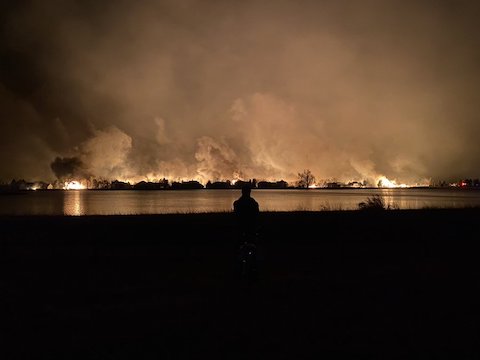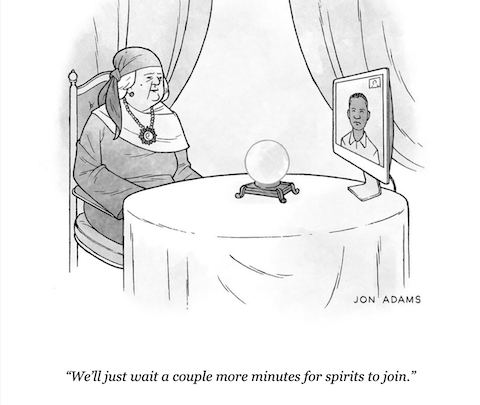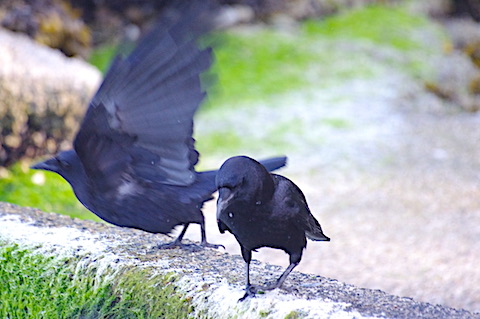
Drawing by Rebecca Clark, who has a new book out.
“Relax — nothing is under control” goes the poster, with a picture of a serene robed Buddhist meditator. The US is clearly sliding into fascism. The left is now seemingly as befouled by conspiracy theorists as the right. The western media seem to have given up all pretence of serious journalism. Climate and ecological collapse are accelerating and completely out of control. Inflation, which is actually twice the “official” numbers at over 16%, threatens to deep-six our utterly debt-dependent economy, when interest rates soar to catch up to it and monthly minimum loan and mortgage payments triple. And then there’s the pandemic…
But for some reason I’m more at peace than I have been in a long time. It’s kinda like I knew this shit was coming, so now we’ll see if I got the consequences right. I am scared of social collapse, but economic and political collapse, as hard as they will be, if they’re inevitable anyway, might as well happen sooner as later. It’s kinda like those predictable, unbearably long Hollywood movies — where’s the fast forward button? How’s it going to end?
COLLAPSE WATCH

photo of the Marshall “urban firestorm” that hit parts of suburban Denver Colorado six weeks ago, by Kyle Clark, posted on his Twitter feed
The phenomenon of “urban firestorms”: David Wallace-Wells interviewed climate scientist Daniel Swain who was on the scene of the terrifying fire that hit the Boulder area at year-end. Daniel said this storm was not a forest fire, but a different phenomenon he calls an “urban firestorm” that areas like the SW US, suffering from its longest drought in history, may have to get used to. Such fires, born of hurricane-force winds and tinder-dry land, race through concrete-and-steel suburban areas with the same ease that wildfires consume forests. There’s no telling what city they might hit next, and no telling what other climate-change phenomena are going to upend our sense of what areas are considered ‘safe’ from the worst ravages of climate change.
What happens when the permafrost is gone?: The arctic and subarctic permafrost contains twice as much carbon as our atmosphere, much of it in the form of methane. It also contains microbes from past animal pandemics. And they’re now being released at an unprecedented rate. The permafrost could be completely gone in a few decades, and we have no idea what that will do to our climate or our health. “Once it starts”, a local climate expert says, “you can’t really stop it.”
LIVING BETTER

New Yorker cartoon by Jon Adams
The anatomy of melancholy: For centuries, and even before medicine, writers have been prescribing the same remedies for depression: Exercise, acts of altruism, and learning something new.
Two steps forward…: Michael Moore describes his attendance, as a child, at the enactment of Medicare and The Voting Rights Act on two successive days in 1965. Thanks to John Whiting for the link.
Ten lessons from a vasectomy: Vu Le’s lessons are aimed at small non-profits, but they really apply to all of us. Thanks to Kavana Tree Bressen for the link, and the one that follows.
Why we don’t share more: Miki Kashtan outlines four obstacles that often prevent the flow of goods, services and other offerings (like spare time and extra space), from those with an excess to those in need: cynicism and distrust, the invisibility of needs (and ‘needers’), feelings of guilt, shame & obligation, and ‘scarcity thinking’. I would add ‘fake philanthropy’ to the list.
The ladder of inference: Reasoning inductively rather than deductively is an essential part of how we make meaning. The “general guidelines” proffered by “The Systems Thinker” are wise advice on how inference works (Thanks to greaterthan for the link):
- Notice your conclusions as conclusions based on your inferences, not as self-evident facts.
- Assume your reasoning process could have gaps or errors that you do not see.
- Use examples to illustrate the data you select that led to your conclusions.
- Paraphrase (out loud) the meanings you hear in what others say, so that you can check if you are understanding correctly.
- Explain the steps in your thinking that take you from the data you select and the meanings you paraphrase to the conclusions you reach.
- Ask others if they have other ways of interpreting the data or if they see gaps in your thinking.
- Assume that others may reach different conclusions because they have their own Ladder of Inference with a logic that makes sense to them.
- Ask others to illustrate the data they select and the meanings they paraphrase.
- Ask others to explain the steps in their thinking.
POLITICS AND ECONOMICS AS USUAL

from the Memebrary
A master class in eroding democracy: In another stellar rant, Andrew Nikiforuk says most of us now have a choice between ‘leaders’ who want to subvert democracy and ‘leaders’ who are inept at governing in a democracy.
Corpocracy, Imperialism & Fascism: Short takes (wages of privilege edition):
- Andrew also eviscerates the mad incel-inciting Jordan Peterson for his demands that Canada end all the CoVid-19 restrictions that he finds inconvenient. Whack-job Peterson further disgraces himself and our whole country by denying climate change, based on his credentials as a, um, ex-psychology professor?
- The delusional faux-billionaire megalomaniac Elon Musk declares Canada’s government “illegitimate” based on, well, who the fuck knows?
- Tweedledee Biden has ordered US banks, and those of its allies, to “freeze” $10B in accounts held by Afghani organizations, most of it foreign aid money being used to deal with the current famine, and has set aside (ie stolen) half of it to be given to unnamed “9/11 victims”. There’s a word for this: genocide.
Misinformation and Disinformation: Short takes:
- Caitlin Johnstone reports on how Alexander Vindman, shill for the US security apparatus and military contractors, fear-mongers about “imminent” “massive” war between the US and Russia. Meanwhile, Ukraine’s president tells the war-mongers to STFU and go away. He doesn’t want to be a US pawn.
- If you thought Ukraine is or was ever a functioning democracy that “the west” should be risking war for, think again. Have the media conveniently forgotten how they were duped into supporting war in Iraq? Thanks to John Whiting for the second link, and the one that follows.
- British doctor Roopa Farooki’s new book Everything is True describes what front-line health-workers have had to go through during CoVid-19 while the politicians (mostly) lied, waffled, and did too little, too late.
- Most of the donors who sent money to the befuddled and propagandized Canadian truck convoy protesters are US residents, and most of them donated anonymously.
CoVid-19 Becomes the Pandemic (mostly) of the Unvaccinated: Short takes:
- CoVid-19 is beginning to look a lot like the ‘Russian’ pandemic of 1889, which had many waves, became global in just four months (and this is before airplanes were invented), and lasted ten years. (A trifecta this month for Andrew Nikiforuk’s reporting.) We knew about this pandemic’s history back in 2010.
- Physician Dhruv Kullar provides some critical information about Omicron, and specifically about what we don’t know about it. Key takeaway: The variant is so widespread that more than half the people hospitalized and diagnosed with Omicron were admitted for non-CoVid-related reasons, and only found they had it when they were admitted. If they would have been hospitalized anyway, it raises the question what proportion of reported deaths of people with CoVid-19 actually died from other causes, and would have died as quickly even if they didn’t have CoVid-19. Excess deaths numbers, monitored by the World Mortality Dataset folks, continue to drop.
- There’s more evidence that people living in much of Africa and Asia seem to have a stronger natural immunity to CoVid-19 than ‘western’ nations whose immune systems have been weakened by poor diet, chronic illness, and lack of exposure to microbes due to our overuse of antimicrobials.
- Sabine Hossenfelder explains what the latest actuarial data on CoVid-19 tell us. Key takeaway: People who’ve died of CoVid-19, on average, would have lived 14 years longer if they hadn’t caught the disease.
- Mandates work. Like them or not, their effectiveness is now beyond all reasonable doubt.
- A synopsis from NPR sums up where we stand now:
- We are likely to need regular boosters every few months, perhaps for years, at least until all the prevailing variants are as mild as seasonal flu, and again if/when new virulent variants emerge. Hopefully vaccines and other preventatives and treatments with broader and longer-lasting efficacy will be developed.
- Wearing masks when ill, indoors in crowds of strangers, or when compromised, is going to be the right thing to do for the foreseeable future.
- Barring the emergence of a new and more virulent variant, life should otherwise return to the ‘new normal’ by this summer (as I boldly predicted in December).
- Vaccines and masks have been and will remain the best strategy for avoiding serious infection, reinfection and death, as well as avoiding Long CoVid.
- The research goes on (thanks to Kavana Tree Bressen for this link).
FUN AND INSPIRATION

New Yorker cartoon by Elisabeth McNair
Two lovely essays on being nothing and doing nothing: Indi Samarajiva writes about the Buddhist concept of no-self, versus the “modern mindfulness industry”. And he writes about the local, unfarmed cows in Sri Lanka where he lives, showing us the wisdom of doing nothing.
“Headline” from The Beaverton: “Healthcare worker convoy cancelled again due to 16-hour hospital shift”
Texting en français: All you need to know when IM’ing vos amis.
Ulysses at 100: Chris Hedges writes about the message of James Joyce’s classic on the centenary of its publication. Thanks to John Whiting for the link, and the one that follows.
Jonathan Pie visits the NYT: One of British comedian Tom Walker’s best ever Jonathan Pie rants, as he tears a strip off Boris J. First appeared as a “video op-ed” in the NYT. More please.
Actually it was about race: Adam Serwer explains how Whoopi Goldberg got into hot water over her remarks about the Holocaust not being about race. Fascinating reading.
What was Earth like 4B years ago?: The answer will probably surprise you. For a start, it completed a rotation every 10 hours, not every 24. And the moon didn’t exist, yet.
Richard Powers on life not separate: The author of the novel The Overstory, written from “tree consciousness”, talks about the meaning of community. Thanks to Rebecca Clark for the link.
Frequently asked questions about crows: A fascinating collection of facts about corvids, from the Cornell Lab of Ornithology.
THOUGHTS OF THE MONTH

one of my own shots, in search of a caption
From Indi Samarajiva: on individual ‘responsibility’:
It’s just another way that data is used [by White Empire] to fundamentally not do anything, while dumping the entire weight of social problems on individuals to somehow figure out. The problem here is that this is not your problem. You — the individual — should not have to be an amateur nutritionist, psychologist, and epidemiologist [or climate scientist] just to survive. You should not be crunching numbers before taking a bite. You should not be reading pre-prints before taking a flight. This data should not be processed at the individual level at all. It should all be processed at the social, cultural, and institutional level, ie not in your stupid monkey mind… Thus the real problem is not that you’re eating the wrong food or raising your kids wrong or that you failed to breathe right. The problem is that you, some random ape, has to be figuring all this shit out on your own. The real problem is that the society around you has died.
Also from Indi, on the use of alternative pronouns:
When someone says ‘call me they/them’ they are actually asking to be addressed with respect, and that is what certain people do not want to give. The real response, under all the verbosity, is ‘who the fuck are you?’ [to tell me what to call you]. The real rage is about conceding power, not pronouns. In English this is a messy debate because they literally don’t have words for it and start talking about biology and shit when it’s really sociolinguistics. On the other hand the conflict would be quite clear in Tamil. If you asked the older generation to call certain younger, marginalized people இவர (literally ‘respectfully gender- neutral’) their fucking heads would explode, and everyone would know why. This is what’s invisibly happening in American English.
From Caitlin Johnstone on the Ukraine invasion nonsense:
Looking to the mainstream media for truth is like looking to a prostitute for love. That’s not what they’re there for. That’s not their job.
From John Mellencamp (in the biography by Paul Rees):
Let’s address the [John Mellencamp as] ‘voice of the heartland’ thing. Indiana [where I grew up] is a red state. And you’re looking at the most liberal motherfucker you know. I am for the total overthrow of the capitalist system. Let’s get all those motherfuckers out of here. [Check it out.]




